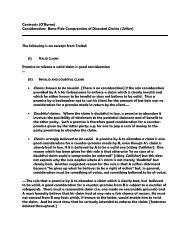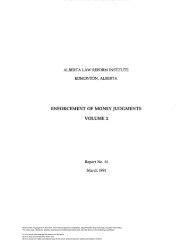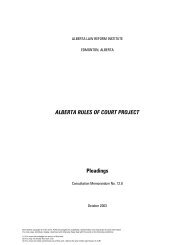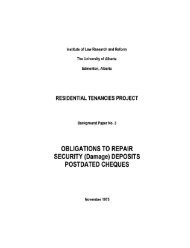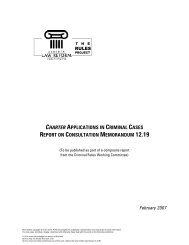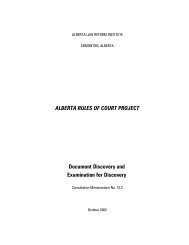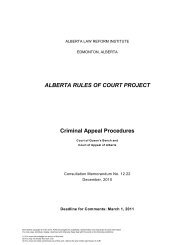ALBERTA RULES OF COURT PROJECT Enforcement of Judgments ...
ALBERTA RULES OF COURT PROJECT Enforcement of Judgments ...
ALBERTA RULES OF COURT PROJECT Enforcement of Judgments ...
You also want an ePaper? Increase the reach of your titles
YUMPU automatically turns print PDFs into web optimized ePapers that Google loves.
2<br />
What use is a judicial system that purports to resolve a dispute if the<br />
resolution it determines cannot be implemented effectively? Moreover, a<br />
just and efficient enforcement system is necessary if credit is to<br />
continue to play its fundamentally important role in the operation <strong>of</strong> our<br />
5<br />
commercial system.<br />
While the Institute was talking about money judgments, the proposition applies<br />
equally to non-money judgments or orders. A legal system may go to great lengths to<br />
reach a just solution to a dispute, but that effort will be worthless if there is no<br />
effective, efficient and credible system <strong>of</strong> remedies to enforce the court’s decision.<br />
One practitioner astutely observed that these problems are very important because they<br />
involve “bread and butter issues” for parties and counsel alike.<br />
B. A Remedial System Must be Fair, Appropriate and Reasonable for All<br />
Parties<br />
[4] While remedies must give successful litigants confidence in the process and a<br />
reasonable hope <strong>of</strong> recovery, they must also protect the legitimate rights <strong>of</strong> the<br />
unsuccessful party to fair and reasonable enforcement. Jack Beatson, in a recent paper<br />
on English creditors’ remedies law, argues that remedies must conform to “the<br />
principle <strong>of</strong> proportionality”, that is, drastic remedies should be used only “when less<br />
6<br />
intrusive forms <strong>of</strong> enforcement ... have not worked or are not available.” Beatson<br />
goes on to summarize four principles which the Scottish Law Commission applied to<br />
the remedy <strong>of</strong> distress.<br />
We agree.<br />
The first <strong>of</strong> these is the rule <strong>of</strong> law requirement that where the law<br />
confers a right on any person, it must also supply an effective<br />
mechanism to make the right genuine and real in its practical effect.<br />
Secondly, there is what the Commission terms the principle <strong>of</strong> least<br />
coercion, broadly the equivalent <strong>of</strong> proportionality as described above.<br />
Thirdly, there is what the Commission terms the principle <strong>of</strong><br />
appropriateness. This means that legal procedures should be designed to<br />
achieve their objectives in as direct a manner as possible. Finally, there<br />
7<br />
is the principle <strong>of</strong> effective enforcement.<br />
5<br />
6<br />
7<br />
Ibid., vol. 1 at 21.<br />
Beatson, supra note 1.<br />
Ibid. at 11.





